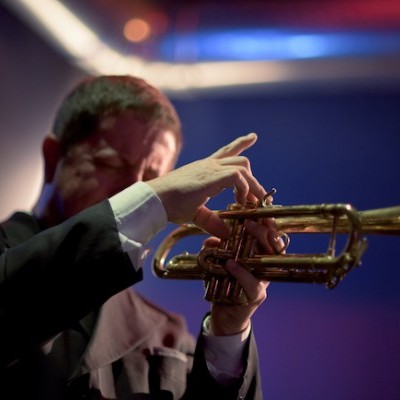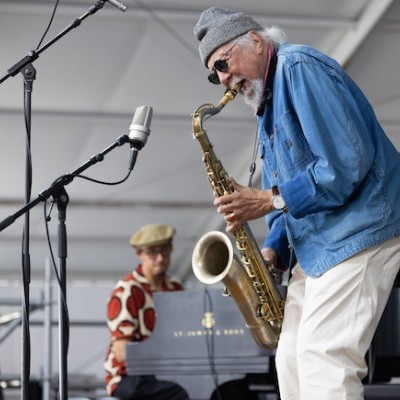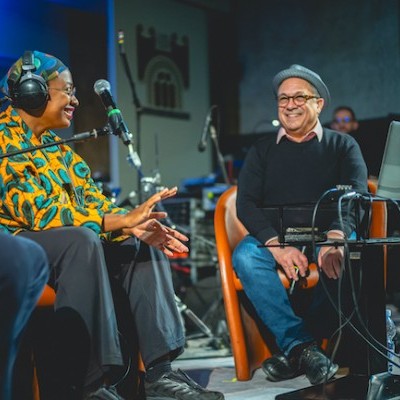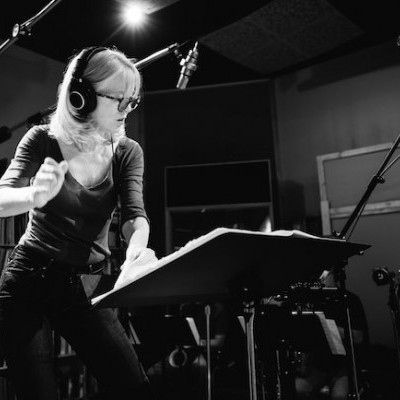Jul 9, 2024 11:35 AM
Trumpeter, Educator Jim Rotondi Dies at 61
Jim Rotondi, a renowned hard-bop trumpeter, composer and educator, died suddenly on July 7 at a hospital in France. He…
In 2014, when singer Cécile McLorin Salvant and pianist Aaron Diehl played the Biamp PDX Jazz Festival in Portland, Oregon, they received a backstage visit from one of the city’s most distinguished jazz musicians, Chuck Israels. The veteran bassist—a noted arranger and composer perhaps most famous for performing as a member of the Bill Evans Trio between 1961 and 1966—had retired there after a career teaching jazz at Western Washington University.
He must have made an impression on the two rising stars. They met again, a few years later in New York, when Israels was serving as a judge in the Essentially Ellington Competition at Jazz at Lincoln Center. This time, the pair asked him to brunch.
“And I thought, ‘Oh, young people who think I still have some pertinence to their lives,’” Israels, 82, recalled in a backstage interview with Diehl before their March 6 show at Dizzy’s Club Coca-Cola at JALC.
“Absolutely,” Diehl, 33, replied.
Israels had booked the evening for his Nextet, a slimmed-down version of the eight-piece jazz orchestra that bears his name. When his regular Portland pianist, Dan Gaynor, couldn’t make the New York date, Israels said, “I immediately called Aaron.”
The Dizzy’s gig marked the first time the two have played together professionally, but they’ve admired each other’s work for years. “In the jazz world,” Diehl said, “sometimes egos get in the way, but with Chuck it’s nothing personal. He’s always 100 percent about the music. He’s a stickler for detail, but not at the expense of communication. And it’s great to have the opportunity to play with someone who’s played with so many people. There are very few opportunities to do that anymore.”
“Well, most of my friends are gone,” Israels replied. “I have genes that I’ve inherited that are keeping me around. I don’t feel any different than when I was 40.”
Israels likewise holds Diehl in high regard, observing that the pianist, who lately has been playing Gershwin and Phillip Glass repertoire with major orchestras, brings uncommon resources to the piano. “The kinds of musical experiences that have poured into his consciousness, and remain there available for him to use, are wide ... and without letting go of the continuity to Louis Armstrong that we need to make it feel like jazz. When he plays, things happen that feel integral, but that many other jazz pianists might not think of doing.”
“And,” he added, “I kinda like the guy, too.”
“It’s a real honor, Chuck,” Diehl replied.
Bill Evans’ music still has “a big grip” on him, Israels said. And while not everything the Evans trio did was arranged, Israels said they always tried to create the illusion that it was. “And we want that same illusion [in my current group]—we don’t want people saying how clever these arrangements were, but rather, ‘Boy, that was effective, how did they all figure out how to do that together?’”
Diehl said his own approach has changed somewhat in the past few years. “John Lewis has always been one of my heroes. He was very much a stickler for detail. But, studying with Fred Hersch [now], I’ve sort of stepped back from that a bit. I’m experimenting with taking more freedom in my own playing. It’s an equilibrium you try to strike between a strict, notated idea and more freedom in the ensemble ... how we can sound like we’re organized when playing freely.”
Israels agreed: “You try to make the written music sound spontaneous, and you try to make the improvised music sound so integrated that it sounds composed.”
In the club that night, they were joined by the members of Israels’ Nextet—trumpeter Charlie Porter, tenor saxophonist Tim Wilcox, trombonist John Moak and drummer Jimmy Madison—in a program that offered a mix of Israels’ imaginative versions of jazz classics with original tunes.
The group had an appealing combination of crisp arrangements and a low-key looseness. They led with Billy Strayhorn’s “Johnny Come Lately,” a Duke Ellington band mainstay. After a round of solos that included inventive work by Porter and Wilcox, and an evocative trombone solo with plunger mute by Moak, it was time for Diehl’s first solo of the night. It didn’t disappoint, with a repeated riff that sounded like it could have emanated from Ellington’s sax section, followed by big, orchestral chords with harmonic details that bore witness to Israels’ earlier remarks about Diehl’s eclectic influences.
“I Should Care” was a faithful expansion of the Evans arrangement to sextet. Eloquent, locked-in solos by Wilcox and Moak were followed by Israels’ first solo of the night, concise, sweet-toned and clever, ending with a quote from “Fascinating Rhythm.”
Then came John Carisi’s “Israel” (another composition associated with Evans) and the originals “Garden Of Delights” and “Dark Tapestry,” an intricately arranged ballad derived from Evans’ “Time Remembered” that featured a haunting guest vocal by soprano Jessica Israels, Chuck’s daughter. Next was the ruminative blues “Bass Intentions”—the title track from the Nextet’s new album on Soulpatch Music. The leader’s arrangement of the traditional lullaby “All The Pretty Horses” was, by turns, meditative and bluesy, and in the end, melancholy. The set closed with all the members stretching out on Miles Davis’ “Walkin’.”
Throughout, despite the uniform excellence of the soloists and Diehl’s charisma, Israels’ arrangements easily were the evening’s star. DB

Jim Rotondi was acclaimed for his wide, round trumpet tone, remarkable virtuosity and assured swing.
Jul 9, 2024 11:35 AM
Jim Rotondi, a renowned hard-bop trumpeter, composer and educator, died suddenly on July 7 at a hospital in France. He…

Charles Lloyd, seen here at the 2024 New Orleans Jazz & Heritage Festival, makes DownBeat Poll history!
Jul 11, 2024 12:23 PM
The incomparable Charles Lloyd swept the 72nd Annual DownBeat Critics Poll, becoming the first artist ever to earn…

“Being president of Blue Note has been one of the coolest things that ever happened to me,” Was said. “It’s a gas to serve as one of the caretakers of that legacy.”
Jun 4, 2024 12:21 PM
Sitting with Don Was is a comfortable and unhurried exercise. He may seem slightly reserved at first, but ideas and…

“She reminds me of my childhood and makes we want to cry,” Cécile McLorin Salvant, pictured here with writer Ashley Kahn, said of Dianne Reeves.
Jun 11, 2024 12:31 PM
Italy’s Umbria Jazz Winter is one of those rare annual festivals that not only coincides with a major holiday —…

Maria Schneider said of Decades, her new compilation release: “I just wanted to create something, put it in a beautiful box and say, ‘Look at what we did.‘”
Jun 18, 2024 12:00 PM
Maria Schneider opened the sleek black box and placed it on a coffee table in her Manhattan apartment. Inside lay the…